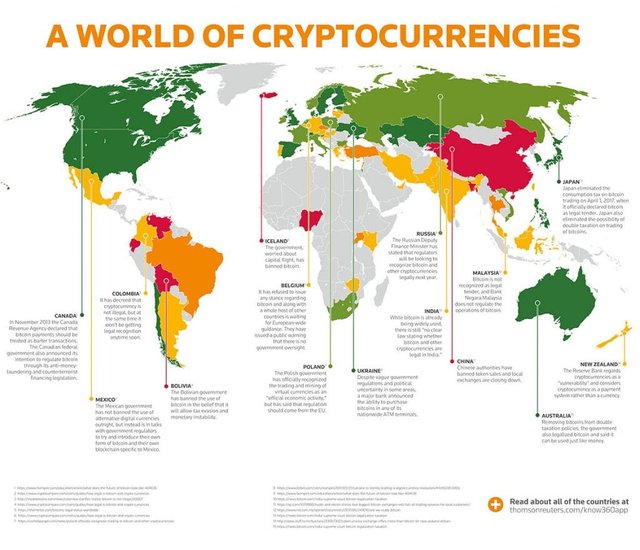The legalization battle of cryptocurrencies is going on ever since the success stories of bitcoin started surfacing the internet. The term ‘cryptocurrency’ refers to a digital currency that is used for performing digital transactions and uses cryptography to ensure the security of such transactions.

Bitcoin (BTC) may have been the first widely successfully cryptocurrency, but it was soon followed by many others, including Ethereum (ETH), Litecoin (TCC), Dash, Ripple and more. Now, we have so many cryptocurrencies that we often wonder which ones are actually legal and which are not.
The problem with cryptocurrencies is that they do not have a regulation system. In fact, crypto tokens are not made to regulate. This is why it is usually difficult for the governments (or countries) to legalize these currencies.
While many countries have not shown a positive attitude towards cryptocurrencies, there are a number of countries where the use and trading of these currencies are illegal. Let’s find out which these countries are and which crypto-coins are legalized by which countries.
Cryptocurrency Legality by Country
- Japan
- United States
- Germany
- France
- Malta
- Canada
- Belarus
- Holland
- Vietnam
- Singapore
- Thailand
- India
- Russia

Cryptocurrency Legality by Country
Japan
Being one of the fastest developing technology markets in the world, Japan had to legalize cryptocurrencies sooner or later. The country’s government has set up a specific PSA (Payment Services Act) based framework which allows some cryptocurrencies and a number of exchanges to be used for payment and trading purposes. Japan is now widely considered a hub for cryptocurrency trading/exchange in Asia.United States
The US government, in 2013, accepted bitcoin as a decentralized virtual currency that can be used for performing transactions. It was classified as a commodity by CFTC in September 2015.Bitcoin is also taxable as a property. To sum up, bitcoin is legal in the USA, however, there is no clarification about the legalization of other cryptocurrencies.Germany
Germany is one of the few European countries that not only allow cryptocurrencies but are also actively involved in the development of blockchain solutions.Germany has completely legalized bitcoin allowing citizens to transact and trade in this coin. The recognition of Bitcoin by the German government has also improved the value of these coins in the worldwide market.France
By issuing a regulation note on 11 July 2014, the country has legalized the operation of virtual currencies such as bitcoin, along with cryptocurrency exchanges, taxation and provided authority to those who are involved in the trading and use of such currencies.Malta
Malta has added its name to the long list of countries that are finally accepting bitcoin and other cryptocurrencies as a legal mode for digital transactions.The cabinet of Malta recently approved the bills regarding the regulation of cryptocurrency and ICOs in the country, which officially makes it a fully fledged crypto-legal country.Canada
In August 2017, the Canadian government accepted Impak Coin as its first legalized cryptocurrency. The Quebec regulation authority had previously legalized bitcoin for some limited business models including ATMs and exchanges.However, the Bank of Montreal and some other Canadian states do not allow their customers to use their bank cards for performing cryptocurrency transactions.Belarus
Effecting from March 28, 2019, cryptocurrencies will be legalized in Belarus, as per a recent order by the government.In addition to the leading crypto-coins, many exchanges, ICOs, and smart contracts will also be legal in the country. The step was taken with the aim to enforce the development of a digital economy. As per the news, crypto activities will be completely tax-free.Holland
It is one of the countries which has shown a positive attitude towards bitcoin and other virtual currencies. There is a special region, called “Bitcoin City” in Holland where all bitcoin transactions including retail purchases, trading and business are completely legal.However, the Holland government has not yet regulated or officially legalized the use of any cryptocurrency.Vietnam
The trading and purchase of cryptocurrencies are legal in Vietnam, however, the government of Vietnam doesn’t allow its citizens to use any virtual currency as a payment tool.That means creating new cryptocurrencies and launching ICOs in Vietnam is completely legal and so is the trading of cryptocurrency at popular exchanges. The government is also reportedly working on legalizing bitcoin as a method of payment by 2018 end.Singapore
The use and trading of bitcoin and other popular virtual currencies are legal in Singapore, but the government doesn’t control the operations or price of these currencies. Cryptocurrencies, by nature, are supposed to be unregulated.Therefore, it shouldn’t be a problem for merchants and consumers in Singapore to freely use cryptocurrencies. The use of bitcoin in Singapore is taxable in some cases.Thailand
The bank of Thailand had legalized the use of bitcoin in the country in 2017. The exchange and trading of digital currencies are allowed provided that proper care is taken. Only licensed bitcoin exchanges in Thailand are allowed to exchange cryptocurrencies for Thai Baht.However, the central bank of Thailand doesn’t allow its users and associated financial institutions to participate in any kind of cryptocurrency related business.India
The Indian government has somewhat been neutral about the use or trading of cryptocurrencies including bitcoin. The Reserve Bank of India (RBI) does not allow the sale or purchase of cryptocurrency, and the government doesn’t recognize any virtual currency or related transaction.But that hasn’t stopped people in India from using or investing in cryptocurrencies. In fact, there are many launching and running in the country successfully.Russia
In an announcement made in November 2016, the Federal Tax Service of Russia declared bitcoins as “not illegal”. Even though it doesn’t say that bitcoins or any other Cryptocurrency Is Legal & Illegal in the country, people are allowed to purchase, sale or trade in virtual currencies at their own risk.The government doesn’t regulate, support or control the exchange of cryptocurrencies but these are not prohibited from operating.Apart from the ones mentioned above, below are the lists of the countries that support (or do not support) cryptocurrencies.
Cryptocurrency is legal in the following countries
Morocco
Nigeria
Namibia
South Africa
Zimbabwe
Canada (banned by banks)
Mexico
United States
Costa Rica
Nicaragua
Trinidad and Tobago
Jamaica
Brazil
Argentina
Colombia
Chile
Kyrgyzstan
Cyprus
Israel
UAE
Jordan
Saudi Arabia
Iran
Lebanon
Turkey
India (banned by banks)
Pakistan
China
Japan
Hong Kong
Taiwan
South Korea
Indonesia
Philippines
Cambodia
Malaysia
Thailand (banned by banks)
Singapore
Vietnam (not allowed as a payment tool)
Croatia
Germany
Poland
Austria
Czech Republic
Romania
Slovenia
Slovakia
Switzerland
United Kingdom
Australia
New Zealand
Ireland
Netherlands
Belgium
France
Luxembourg
Greece
Italy
Bulgaria
Bosnia and Herzegovina
Malta
Spain
Portugal
Sweden
Iceland
Norway
Denmark
Ukraine
The legalization of cryptocurrencies doesn’t necessarily mean that the government of the particular country supports or promotes virtual currencies in any way.
Following Countries Have Declared Cryptocurrencies as illegal

Algeria
Bolivia
Ecuador
Bangladesh
Nepal
Macedonia
As you can, most countries around the world have started accepting cryptocurrency for various purposes. If you are planning to start a business in this field, this is a perfect time
Author: Dr.Bahrami🇮🇷
In Costa Rica cryptocurrencies are banned in banks. If you buy them using a costarican bank account, said account will be closed. At least, as far as I know that's so with the major state-owned banks, I don't know if that also applies with the private banks but that is the most likely.
I think the right term for the cryptocurrencies legal status in Costa Rica would be "not illegal", because they are not expressly banned, but they are not specially welcome.
They are not regulated and you can owned them without being taxed for them, and they can be even used in private transactions, but the government encourage their citizens not to use them, and I guess, there wouldn't be law protection if you are scammed using cryptocurrencies, but I'm not so sure about it. I would need to investigate more about it in that regard.
Downvoting a post can decrease pending rewards and make it less visible. Common reasons:
Submit